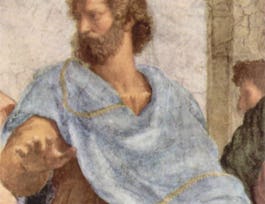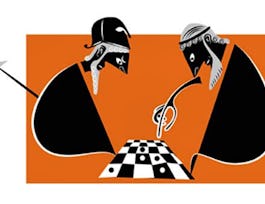What is philosophy? How does it differ from science, religion, and other modes of human discourse? This course traces the origins of philosophy in the Western tradition in the thinkers of Ancient Greece. We begin with the Presocratic natural philosophers who were active in Ionia in the 6th century BCE and are also credited with being the first scientists. Thales, Anaximander, and Anaximines made bold proposals about the ultimate constituents of reality, while Heraclitus insisted that there is an underlying order to the changing world. Parmenides of Elea formulated a powerful objection to all these proposals, while later Greek theorists (such as Anaxagoras and the atomist Democritus) attempted to answer that objection. In fifth-century Athens, Socrates insisted on the importance of the fundamental ethical question—“How shall I live?”—and his pupil, Plato, and Plato’s pupil, Aristotle, developed elaborate philosophical systems to explain the nature of reality, knowledge, and human happiness. After the death of Aristotle, in the Hellenistic period, Epicureans and Stoics developed and transformed that earlier tradition. We will study the major doctrines of all these thinkers. Part I will cover Plato and his predecessors. Part II will cover Aristotle and his successors.


Ancient Philosophy: Plato & His Predecessors
Taught in English
Some content may not be translated
116,192 already enrolled
(1,479 reviews)
Details to know

Add to your LinkedIn profile
8 quizzes
See how employees at top companies are mastering in-demand skills


Earn a career certificate
Add this credential to your LinkedIn profile, resume, or CV
Share it on social media and in your performance review

There are 4 modules in this course
Thales, Anaximander, Anaximenes and Xenophanes seek the material principle of the cosmos, and arrive at a radical new conception of the gods. Heraclitus distills the essence of their “naturalism” in his riddling slogans.
What's included
8 videos2 readings2 quizzes2 discussion prompts
Parmenides poses a fundamental philosophical challenge to all naturalistic inquiry when he denies the intelligibility of change. Later naturalists (Empedocles, Anaxagoras, and Democritus) respond to his challenge. Plato’s portrait of Socrates raises questions about the nature of philosophy, its role in public life, and the relation between morality and religion.
What's included
8 videos3 readings2 quizzes2 discussion prompts
What is virtue, and how can it be taught? What is teaching anyway, and how could we ever acquire knowledge? Socrates gives a geometry lesson purporting to show that learning is recollection. Why should we act justly? What’s in it for us? An elaborate analogy between a city and a human soul seeks to convince us that crime never pays, even if the criminal can escape detection.
What's included
10 videos4 readings2 quizzes2 discussion prompts
The ultimate realities are intelligible Forms, while the world of our experience is only an image of that reality. Goodness is a fundamental feature of the world. Plato’s cosmology: the creation of the universe (complete with a world soul) and the principles of mathematical perfection that structure it at every level.
What's included
6 videos4 readings2 quizzes1 peer review2 discussion prompts
Instructor

Offered by
Recommended if you're interested in Philosophy

University of Pennsylvania

Coursera Project Network

National University of Singapore
Why people choose Coursera for their career




Learner reviews
Showing 3 of 1479
1,479 reviews
- 5 stars
83.09%
- 4 stars
13.79%
- 3 stars
2.16%
- 2 stars
0.33%
- 1 star
0.60%

Open new doors with Coursera Plus
Unlimited access to 7,000+ world-class courses, hands-on projects, and job-ready certificate programs - all included in your subscription
Advance your career with an online degree
Earn a degree from world-class universities - 100% online
Join over 3,400 global companies that choose Coursera for Business
Upskill your employees to excel in the digital economy
Frequently asked questions
Access to lectures and assignments depends on your type of enrollment. If you take a course in audit mode, you will be able to see most course materials for free. To access graded assignments and to earn a Certificate, you will need to purchase the Certificate experience, during or after your audit. If you don't see the audit option:
The course may not offer an audit option. You can try a Free Trial instead, or apply for Financial Aid.
The course may offer 'Full Course, No Certificate' instead. This option lets you see all course materials, submit required assessments, and get a final grade. This also means that you will not be able to purchase a Certificate experience.
When you purchase a Certificate you get access to all course materials, including graded assignments. Upon completing the course, your electronic Certificate will be added to your Accomplishments page - from there, you can print your Certificate or add it to your LinkedIn profile. If you only want to read and view the course content, you can audit the course for free.
You will be eligible for a full refund until two weeks after your payment date, or (for courses that have just launched) until two weeks after the first session of the course begins, whichever is later. You cannot receive a refund once you’ve earned a Course Certificate, even if you complete the course within the two-week refund period. See our full refund policy.



